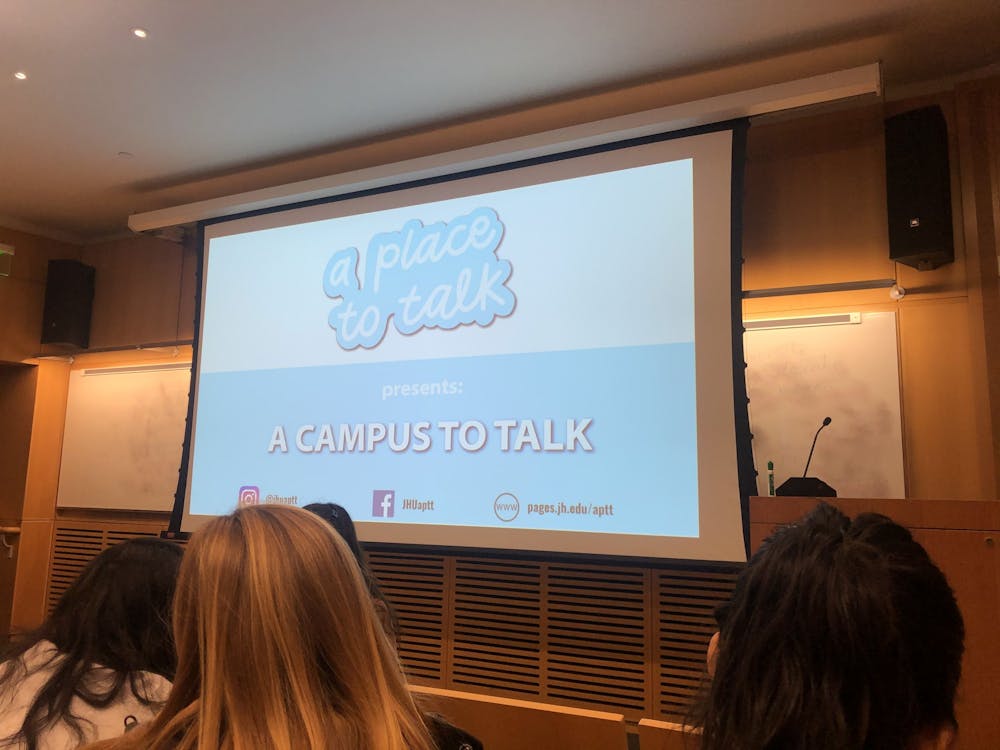A Place to Talk (APTT), a peer listening group on campus, hosted a presentation on mental health and a workshop on empathetic listening this Saturday in Gilman Hall.
APTT listeners, trained in crisis intervention and active listening skills, are a resource for students to share whatever is on their mind. Open past the hours of the Counseling Center, APTT aims to optimize the availability of mental health services for students on campus.
The event was hosted by sophomore Kylie Sharron, the external training director for APTT. During her presentation, Sharron reflected on the current situation of mental health at Hopkins.
“Mental health on this campus is very taboo. People have a lot of trouble discussing their feelings without one-upping each other,” Sharron said. “We have a very stress-based culture, and it’s very difficult for people to talk about their feelings and actually work through them when everyone around them feels like they have it worse.”
In addition to holding evening hours, APTT also offers external trainings to student groups, including clubs and Greek life. These trainings are meant to introduce those students to APTT and the skills of empathetic listening.
The goal of empathetic listening, Sharron explained, is listening and trying to understand what the other person is going through from their perspective.
In an interview with The News-Letter, Sharron explained that A Campus to Talk was designed to share these skills with students who are neither in APTT members nor clubs that request training.
“With every external training that I do, my goal is to at least impact one person in the room and to hope to be able to start that ripple effect, where we just have that one pebble of kindness in this school and it just gets bigger and bigger,” she said.
Sophomore David Hilden, a member of APTT, highlighted the desire of APTT to support Hopkins students.
“A lot of people are here because they’re interested in learning to be a better listener. We want to impact them and help them,” Hilden said.
Senior Jenna Pasternak spoke about what she gained from the event, particularly in regards to the difference between empathetic and sympathetic listening.
“If someone tells you their problem and you go ‘ouch,’ that doesn’t really help them, but if you listen to them and internalize it a little more to show them that you listened, then that might actually make them feel better,” Pasternak said.
Over the course of the event, Sharron gave the audience two tasks designed to help them implement empathetic listening in their everyday lives.
The first task was to embrace silences in conversations.
“Allow things to sit in silence for a little while and really see the other person. Don’t just continue to talk,” she said.
The second task was a challenge to not give people advice. According to Sharron, in our everyday conversations, we often give advice to the people that are telling us about their dilemmas. Giving advice, however, is not a component of empathetic listening. Instead, empathetic listeners, Sharron said, should ask questions which guide the person to their ideal solution.
“We don’t give advice in A Place to Talk. We don’t know properly how to handle a situation the same way the person we are talking to would,” she said.
The second half of the event, a workshop, included practicing the skills learned in the presentation. Audience members practiced taking closed-ended questions and turning them into empathetic open-ended ones. They practiced paraphrasing someone’s words, which allows an empathetic listener to demonstrate their understanding of what the other person is saying.
Audience members then paired up with a member of APTT and acted out talker and listener scenes to practice the techniques which they had just learned.
In an interview with The News-Letter, Freshman Class Senator Chinat Yu stated that he benefitted particularly from this element of the workshop. He hopes to use his position in SGA to support more campus-wide trainings.
“I had been exposed to some ideas beforehand, but never in a workshopping sense. It was never really fleshed out,” Yu said. “I’m glad that I have it all now in one place.”
Sharron also mentioned people who applied to be in APTT but were not accepted, who were not invited to the semester-long training in empathetic listening skills.
“I really wanted to be able to reach out to those people specifically so they can still learn the skills and still be able to participate and engage in what we do without being a part of the club,” she said.
Both Sharron and Hilden shared that their hope for campus-wide trainings was to reduce the stigma on campus surrounding mental health.
“People will say ‘this was a really tough week’ and other people will say ‘how many tests did you have?’ There’s no quantification of feelings,” Sharron said. “I want people to be able to discuss their feelings without being scared to.”
Additionally, Hilden highlighted the need to make campus more empathetic and less competitive.
“We want to remove that competitive atmosphere of ‘I got five hours of sleep,’ ‘well, I didn’t sleep at all,’” he said. “Campus should be a place where we are concerned about each other.”
Similarly, Sharron stressed her goal of making Hopkins a more supportive place.
“This campus can be a very daunting place. What we want to do is make it feel more open and more welcoming,” Sharron said.
A Place to Talk is open Sunday through Thursday from 7 p.m. to 1 a.m. in Wolman Hall, AMR I and Brody Learning Commons Room 1040.





